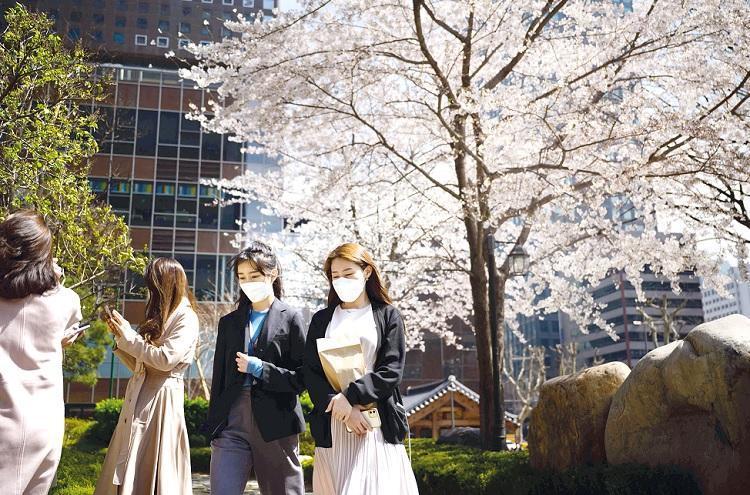
Office workers wearing face masks amid concerns over the COVID-19 novel coronavirus walk past blossoms during their lunch break in central Seoul. (AFP Photo)
South Korea is among the countries hit earliest by COVID-19, but now the number of new cases per day has gone down from 900 in February to nearly 90 this week.
South Korea has been showing that a different approach - without a national or regional lockdown and an entry ban - could be an effective way to fight against COVID-19, the country’s ambassador to Turkey, Choi Hong-ghi, has told the Hürriyet Daily News.
When was the first case detected and what is the current situation of the pandemic in South Korea?
As the first cased was confirmed on Jan. 19, the Republic of Korea was among the countries hit earliest by COVID-19 with total 9,661 confirmed cases (accumulation) and the total death toll of 158 as of March. 30. However, recently the number of new cases per day has gone down to around 100, after hitting 909 in Feb. 29. Furthermore, the number of patients who fully recovered began to surpass that of the new confirmed cases, and as a result about 54 percent of confirmed patients had already been released.
A unique feature of the COVID-19 infections in Korea is that a large part of confirmed cases has occurred in a specific region (Daegu) and a group (Shincheonji Church) making up each 69 percent, 53 percent of total cases. Also, the once sharp rise of infection cases has been derived from its high capacity to run about 15,000-20,000 COVID tests per day, as well as its ability to conduct intensive epidemiological analysis on high-risk patients.
What are the measures your government has taken so far?
The Korean government’s response can be categorized into three areas: Prevention, detection and treatment. The government has been implementing “Special Immigration Procedure” on visitors, though without forcing a full entry ban except visitors from Hubei province of China. The procedure is designed to thoroughly monitor anyone entering the country from their moment of entry over the course of 14 days, and it has been working efficiently. Most recently, every inbound traveler from Europe and all symptomatic persons from the U.S. are required to be tested upon arrival. In addition, starting from April 1, almost everyone entering Korea will be required to self-isolate for 14 days.
For the early detection, testing has played a crucial role in Korea. The health authorities have chosen to test everyone who has been in close contact with the confirmed cases. Rather than waiting for patients to come in, the government pursued and tracked down possible patients to prevent the spread within the community. More than 400,000 tests (with positivity rate 2.4 percent) have been performed to date at 635 testing sites including drive-thru clinics and 118 laboratories nationwide. It is also the main factor behind Korea’s low mortality rate of 1.59 percent.
When cases are confirmed, the government promptly conducts epidemiological investigations to track infection sources and screen contacts. Especially, the government thoroughly identifies the whereabouts of confirmed cases based on their credit card use history, CCTV, as well as mobile phone location and discloses them to prevent additional infections, though without exposing any personal information.
What is the main approach your government has adopted?
From an early stage of the outbreak, the Korean government has set key principles to combat COVID-19: Openness, transparency and keeping the public informed. Various aspects of information regarding COVID-19 have been disclosed transparently and rapidly. For example, the travel histories of confirmed patients are being made public.
The government has maintained the policy of keeping the doors open without an entry ban. Furthermore, no national or regional lockdown has been implemented. The Korean government firmly believes that this policy is needed to minimize COVID-19’s negative repercussions on the world and the domestic economy. For that reason the president of Korea, Moon Jae-in, proposed in the G-20 summit last Thursday to adopt conditional exemption of entry ban, allowing for the travel essential persons, such as businesspeople, medical professionals and scientists with medical certificates showing negative test results.
When do you think this outbreak would be totally defeated in your country?
By observing that there is a stabilizing trend of newly confirmed cases, most people of Korea are becoming confident that the current approach and measurement of the government are working and are hoping that Korea will fully overcome COVID-19 soon. However, the government believes that now is not the time for being complacent, and thus is maintaining its vigilance as new sporadic group infections continue, along with the recent rise in the number of imported cases.
Is your government in cooperation with other nations in fighting COVID-19?
The Drive-thru Testing Station that the Korean government has pioneered has been adopted by many countries including the U.S., Germany and U.K. The government is committed to its contribution to global efforts to develop a vaccine for COVID-19. Korea is becoming a major supplier of some devices, especially COVID-19 test kits. As more than 100 countries in need of test kits and other items have sought to import them or receive them as humanitarian aid, the government is working closely with several private producers to meet the global demand.